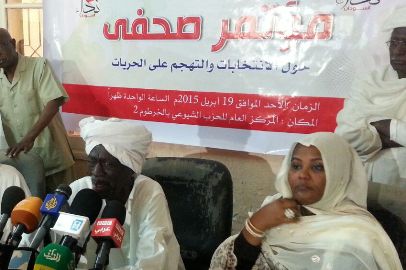Sudan Call forces to mediate between SPLM-N factions
July 16, 2017 (KHARTOUM) – The opposition Sudan Call alliance Sunday announced the formation of a committee to broker a mediation between the two factions of the Sudan Liberation People’s Liberation-North (SPLM-N) and expressed willingness to coordinate with other opposition groups.

In a meeting held on Saturday in Omdurman, the opposition parties members of Sudan Call forces, which are allied to the SPLM-N and two armed groups from Darfur, discussed the recent political developments in the country and ways to reinvigorate the activities of the alliance.
Following the meeting, the opposition parties held a press conference and released a statement where they reiterated their keenness to reconcile the two factions and announced they would mediate between them.
The Sudan Call leaders “tasked a tripartite committee with reaching out to Malik Agar and Abdel-Aziz al-Hilu to consult with them on the issue,” said the statement.
Also, the opposition leaders told reporters during the press conference that al-Hilu responded positively to their initiative and vowed to discuss the matter with them once he completes the reorganisation of his group.
Al-Hilu managed to get the support of the SPLA-N in the Nuba Mountains and says he has the support of the SPLM-N members Blue Nile State. Agar disputes this claim. He calls for a collective resignation of the three-member leadership paving the way for a general conference to discuss the causes of the refit, reorganise the movement and elect a new leadership.
The Sudan Call forces announced their support for the American proposal for the medical humanitarian assistance. Further, they called on the SPLM-N to accept it and to discuss its implementation as soon as possible.
Regarding the peace talks in the two areas, they emphasised that peace requires an inclusive national political process to address the root causes of the conflict.
In the past, the political opposition groups blamed the government and the SPLM for negotiating the 2005 peace agreement that led to the independence of South Sudan without them.
Further, the opposition alliance renewed its determination to continue mobilisation to achieve a just and comprehensive peace and a democratic transition that establishes a state of citizenship and justice.
The Sudan Call said they would work with all the initiatives for a national action against the regime, including those coming from the trade unions, women and youth organisations, and reiterated its keenness to coordinate with them through networking or alliances.
“We extend our hands without preconditions to the National Consensus Forces to coordinate with them on common mobilisation issues and to reach to an optimal platform for a joint action,” further said the Sudan Call.
The Sudan Call forces were part of the National Consensus Forces but diverged on whether or not to negotiate an agreement with the regime on peace and democratic reforms. While the political and military alliance accepted an African Union mediation, the left forces rejected the process.
The opposition alliance also reiterated its rejection of calls by President Omer al-Bashir to participate in the drafting of a new constitution on the basis of the recommendations of the government-led national dialogue process.
U.S. Sanctions
On the permanent lift of sanctions, the opposition said the delay for additional three- month period was expected because the new administration of President Donald Trump needs more time to assess the situation.
They further called to link the revocation of sanctions with the end of war and implementation of a peace agreement and democratic rule ensuring freedoms, justice and preventing corruption.
“Otherwise how an economy can grow under internal and border wars and disputes, how an economy can flourish or a national or foreign investor get the guarantee that his money would be protected against corruption and the intervention of security services in all aspects of economic operations?”
(ST)
